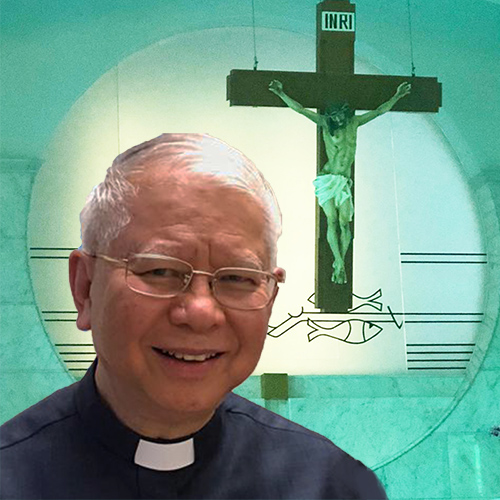神父講道 – 四旬期第四主日 (2023年3月19日)
 恭讀聖若望福音 9:1-41
恭讀聖若望福音 9:1-41
那時候,耶穌看見了一個生來瞎眼的人。耶穌的門徒就問耶穌說:「辣彼,誰犯了罪?是他,還是他的父母,竟使他生來瞎眼呢?」
耶穌答覆說:「也不是他犯了罪,也不是他的父母,而是為叫天主的工作,在他身上顯揚出來。趁著白天,我們應該做派遣我來者的工作;黑夜來到,就沒有人能工作了。當我在世界上的時候,我是世界的光。」
耶穌說了這番話以後,便吐唾沫在地上,用唾沫和了些泥,把泥抹在瞎子的眼上,對他說:「去,到史羅亞水池裡洗洗吧!」──史羅亞解說「被派遣的」──瞎子去了,洗了,回來就看見了。
於是,鄰居和那些經常見他討飯的人,就說:「這不是那曾坐在這裡討飯的人麼?」有的說:「就是這人,」有的說:「不,是另一個很相似他的人。」那人卻說:「就是我。」
他們問他說:「你的眼睛究竟是怎樣開了的呢?」
他答覆說:「名叫耶穌的那個人,和了些泥,抹在我的眼上,給我說:你往史羅亞去洗洗吧;我去了,洗了,就看見了。」他們又問他說:「那個人在那裡?」他說:「我不知道。」
他們便將那先前瞎眼的人,帶到法利塞人那裡。耶穌和泥開了他眼睛的那天,正是安息日。於是,法利塞人又盤問他怎樣看見了。那人就向法利塞人說:「他把泥抹在我的眼上,我洗了,就看見了。」
法利塞人中有的說:「這人不是從天主來的,因為他不遵守安息日。」有的卻說:「一個罪人怎能行這樣的奇蹟?」他們中間便發生了紛爭。於是,他們又問瞎子說:「對於那開了你眼睛的人,你說什麼呢?」瞎子說:「他是一位先知。」
可是,猶太人不肯相信他原先是瞎子,而現在看見了,等到叫了他的父母來,問他們說:「這是你們的兒子麼?你們說他生來就瞎眼麼?怎麼他現在竟然看見了呢?」
他的父母答覆說:「我們知道這是我們的兒子;他生來就瞎眼。現在他究竟怎麼看見了,我們卻不知道;或者誰開了他的眼睛,我們也不知道。你們問他吧!他已經成年,會說自己的事了。」他的父母因為害怕猶太人,才這樣說,因為猶太人早已議決:誰若承認耶穌是默西亞,就必被逐出會堂。為此,他的父母說:他已經成年,你們問他吧!
於是,法利塞人再把那先前瞎眼的人叫過來,向他說:「歸光榮於天主吧!我們知道這人是個罪人。」那人回答說:「他是不是罪人,我不知道;有一件事我知道:我曾經是個瞎子,現在我卻看見了。」
法利塞人又問他說:「這人給你做了什麼?怎樣開了你的眼睛?」他回答說:「我已經告訴了你們,你們不聽;為什麼又願意聽呢?莫非你們也願意做他的門徒麼?」
法利塞人辱罵他說:「你去做他的門徒好了!我們是梅瑟的門徒。我們知道:天主曾給梅瑟說過話;至於這人,我們不知道他是從那裡來的。」
那人回答說:「這真奇怪!你們不知道他是從那裡來的,他卻開了我的眼睛。我們都曉得天主不俯聽罪人,只俯聽那恭敬天主,並承行他旨意的人。自古以來從未聽說:有人開了胎生瞎子的眼睛。這人若不是由天主來的,他什麼也不能作。」
法利塞人卻向他說:「你整個人都生於罪惡之中,竟來教訓我們?」便把他趕出去了。
耶穌聽說法利塞人把他趕了出去,後來遇見了他,就給他說:「你信人子麼?」那人便回答說:「主,是誰,好使我去信他呢?」耶穌對他說:「你已看見他了,和你講話的就是!」那人於是說:「主,我信。」就俯伏朝拜了耶穌。
於是,耶穌說:「我是為了判別,才來到這世界上,叫那些看不見的,看得見;叫那些看得見的,反而成為瞎子。」
有些和耶穌在一起的法利塞人,一聽了這話,就說:「難道我們也是瞎子麼?」耶穌回答說:「你們如果是瞎子,就沒有罪了;但你們說:我們看得見,這樣,你們就有罪了。」
—上主的話。
(4th Sunday of Lent)
A Reading from the Holy Gospel according to John 9:1-41
As Jesus passed by he saw a man blind from birth. His disciples asked him, “Rabbi, who sinned, this man or his parents, that he was born blind?” Jesus answered, “Neither he nor his parents sinned; it is so that the works of God might be made visible through him. We have to do the works of the one who sent me while it is day. Night is coming when no one can work. While I am in the world, I am the light of the world.” When he had said this, he spat on the ground and made clay with the saliva, and smeared the clay on his eyes, and said to him, “Go wash in the Pool of Siloam” —which means Sent—. So he went and washed, and came back able to see.
His neighbors and those who had seen him earlier as a beggar said, “Isn’t this the one who used to sit and beg?” Some said, “It is, ” but others said, “No, he just looks like him.” He said, “I am.” So they said to him, “How were your eyes opened?” He replied, “The man called Jesus made clay and anointed my eyes and told me, ‘Go to Siloam and wash.’ So I went there and washed and was able to see.” And they said to him, “Where is he?” He said, “I don’t know.”
They brought the one who was once blind to the Pharisees. Now Jesus had made clay and opened his eyes on a sabbath. So then the Pharisees also asked him how he was able to see. He said to them, “He put clay on my eyes, and I washed, and now I can see.” So some of the Pharisees said, “This man is not from God, because he does not keep the sabbath.” But others said, “How can a sinful man do such signs?” And there was a division among them. So they said to the blind man again, “What do you have to say about him, since he opened your eyes?” He said, “He is a prophet.”
Now the Jews did not believe that he had been blind and gained his sight until they summoned the parents of the one who had gained his sight. They asked them, “Is this your son, who you say was born blind? How does he now see?” His parents answered and said, “We know that this is our son and that he was born blind. We do not know how he sees now, nor do we know who opened his eyes. Ask him, he is of age; he can speak for himself.” His parents said this because they were afraid of the Jews, for the Jews had already agreed that if anyone acknowledged him as the Christ, he would be expelled from the synagogue. For this reason his parents said, “He is of age; question him.”
So a second time they called the man who had been blind and said to him, “Give God the praise! We know that this man is a sinner.” He replied, “If he is a sinner, I do not know. One thing I do know is that I was blind and now I see.” So they said to him, “What did he do to you? How did he open your eyes?” He answered them, “I told you already and you did not listen. Why do you want to hear it again? Do you want to become his disciples, too?” They ridiculed him and said, “You are that man’s disciple; we are disciples of Moses! We know that God spoke to Moses, but we do not know where this one is from.” The man answered and said to them, “This is what is so amazing, that you do not know where he is from, yet he opened my eyes. We know that God does not listen to sinners, but if one is devout and does his will, he listens to him. It is unheard of that anyone ever opened the eyes of a person born blind. If this man were not from God, he would not be able to do anything.” They answered and said to him, “You were born totally in sin, and are you trying to teach us?” Then they threw him out.
When Jesus heard that they had thrown him out, he found him and said, “Do you believe in the Son of Man?” He answered and said, “Who is he, sir, that I may believe in him?” Jesus said to him, “You have seen him, the one speaking with you is he.” He said, “I do believe, Lord,” and he worshiped him. Then Jesus said, “I came into this world for judgment, so that those who do not see might see, and those who do see might become blind.”
Some of the Pharisees who were with him heard this and said to him, “Surely we are not also blind, are we?” Jesus said to them, “If you were blind, you would have no sin; but now you are saying, ‘We see,’ so your sin remains.
—The Gospel of the Lord.
Cantonese HomilyPodcast (podcast1): Play in new window | Download (Duration: 5:13 — 6.8MB) | Embed
Subscribe: RSS
English HomilyPodcast: Play in new window | Download (Duration: 3:42 — 4.9MB) | Embed
Subscribe: RSS

Recent Comments